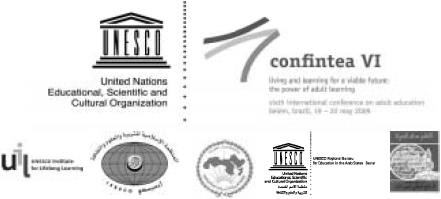
...
1. Call on the Arab States to harmonise their adult education concepts, to view adult education as an integral component of national education and development plans within the framework of lifelong learning, and to build bridges between formal and non-formal education.
2. Call on governments to take the political, strategic, administrative and technical measures needed to guarantee out-of-school children, young girls, women and vulnerable members of society equal access to education, especially literacy and adult education.
3. Confirm commitments to achieving the Dakar EFA goals, especially those concerning literacy and adult education, as well as the goals of the LIFE initiative.
4. Develop and enhance the foundation of and working tools within the field of literacy and adult education, including those structures already in existence.
5. Implement policies and mechanisms to recognise and value all forms of learning within the framework of literacy and adult education, and to adopt systems of validation and accreditation.
6. Call on governments to develop and strengthen the role of educational media in adult education.
7. Call on governments to implement the Plan for the Development of Education in the Arab World adopted at the Arab Summit (Damascus, March 2008), in particular with regard to making basic and adult education compulsory and free.
8. Call on the Arab League and its associated organisations, UNESCO and ISESCO, to intervene as a matter of urgency and propose literacy and adult education projects for occupied countries and countries affected by civil conflicts.
Funding
9. Encourage the Arab States to prioritise literacy and adult education programmes, mobilise adequate resources for their implementation and mobilise a diverse range of national and external additional sources of funding.
10. Create and support an Arab fund to finance adult education projects in Arab countries.
11. Encourage the private sector to play a role in funding literacy and adult education programmes.
Quality
12. Improve adult education programmes so that their output meets quality standards, and promote autonomous lifelong learning.
13. Call on universities and training institutions to establish training programmes for adult educators and create centres specialising in studies and research.
14. Develop laws and systems that will boost the professional and social status of adult educators and implement special training programmes to professionalise the sector.
15. Call on governments to adopt strategies for the use of information and communication
technologies in adult education and learning and to draw on these to build knowledge societies.
16. Make a commitment to establishing a universal culture of quality within an education and learning environment inspired by the traditional Arab culture that encourages lifelong learning.
Partnership-building
17. Call on governments to create more effective mechanisms to ensure that partnerships are formed between the various actors involved in adult education and learning.
18. Call on the Arab States to intensify their partnerships with civil society and the private sector with a view to developing capacity-building programmes in the field of literacy and adult education.
19. Increase the involvement of the target populations at all levels of education and learning activities and create an attractive learning environment.
20. Disseminate innovative success stories and encourage the sharing of expertise within the Arab world as well as regional and international cooperation, giving priority to South-South cooperation.
Monitoring and Evaluation
21. Incorporate monitoring and follow-up activities into adult education policies and strategies.
22. Call on the Arab States to set up a database for planning, monitoring and evaluation purposes and call for the establishment of policies on literacy and adult education.
23. Create a common framework of reference for the observation, monitoring and evaluation of adult education programmes in line with the international criteria and indicators used for data and surveys in the field of adult education.
24. Call on the Arab States to establish national mechanisms for the monitoring and implementation of the decisions and recommendations from this conference.
25. Call on the Arab States to establish and make available to all a regional mechanism for implementing and monitoring the decisions taken at this conference.
26. Call on regional and international organisations (UNESCO, ISESCO, ALECSO and the Arab Bureau of Education for the Gulf States) to create a common mechanism for the monitoring and implementation of recommendations from adult education conferences as part of efforts to complement work at the national and regional levels, and to call for the Arab States to receive the support that they need to do so.
Source: www.unesco.org

DVV International operates worldwide with more than 200 partners in over 30 countries.
To interactive world map